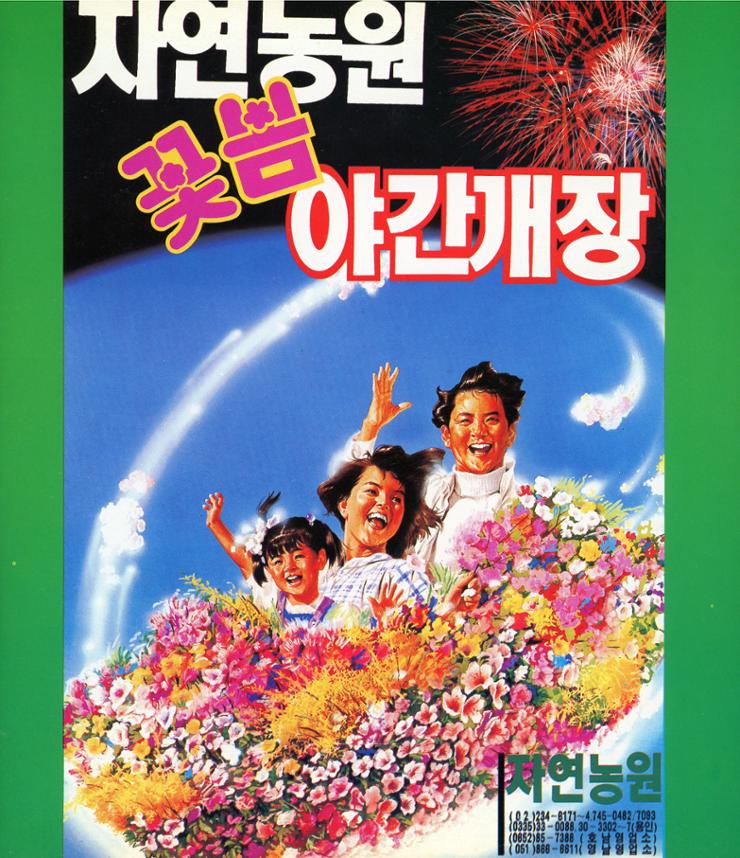
Everland's Four Season Garden / Courtesy of Samsung C&T
YONGIN, Gyeonggi Province — Everland, Korea's largest theme park, greets springtime picnickers with the beauty of flora and fauna through its historic spring flower festivals.
Bae Teck-yung, vice president of Samsung C&T and head of its park operations team, said Everland has a unique heritage that differentiates itself from other theme parks such as Disneyland and Universal Studios.
"It's the old garden that we have grown ever since Everland was called Jayeon Nongwon," Bae said during a press conference on April 16.
Opened in 1976 as Jayeon Nongwon, or in English as Yongin Farmland, the amusement park is now better known as home to a much-loved giant panda family from China and the country's largest thrill ride, T-Express. As Bae said, it had been more of a plantation than a theme park, filled with attractions and wild animals at a time when Korea was still going through economic development.

The opening ceremony of Everland, formerly known as Yongin Farmland, is held in Yongin, Gyeonggi Province, in this file photo from April 17, 1976. Korea Times file
The 15 million square meters of land included "an economic afforestation area, containing paulownia and pine nuts; a fruit-bearing tree complex with chestnuts, walnuts, apricots and gingkoes; and a seed-bed complex," according to The Korea Times article from April 17, 1976.

A Korea Times article announces Everland's opening, published April 17, 1976. Korea Times file
Also, it was used mostly for pig breeding, fish farming and orchards, while it also featured a zoo and a lion safari for tourists.
"It was a hard time to make ends meet, so the plan was to send fruit from the plantation to CheilJedang for canning. The pig farm provided compost for the fruit-bearing trees and pork that was made into sausages," Bae said, explaining the park's initial mission was to "make fruit and meat for the people" to improve their livelihood.
In the 1980s, the park introduced its signature tulip and rose gardens, based on a survey that the rose was the flower most preferred by Koreans.
"At the time, it was considered extravagant to plant flowers on a big piece of land. People thought it should be rather used for rice farming because it was such a difficult time," Bae said.
Then, after 10 years of gardening, the park introduced a rose festival in 1986 and made it into the country's first and emblematic spring flower festival, which was followed by a tulip festival introduced later in 1992.

A poster to Everland's spring flower festival from 1991 / Korea Times file
It continued to be a trailblazer in the country's amusement park history and became known as the "first amusement park" for many things.
It introduced a snow sled park in 1987, Caribbean Bay water park in 1996 and the wooden roller coaster T-Express in 2008. In 2016, it launched Panda World as Ai Bao and Le Bao, the parents of the much-loved Fu Bao, came to Korea.
After decades of progress and innovation, Everland decided to return to its core identity as a plant-themed amusement park, boosted by growing demand for garden tourism.
As the aftermath of the COVID-19 pandemic stresses, people have opted for recreational visits to suburban forests and wellness tourism. The changing trend led to a new trend dubbed "Soop-cance," a portmanteau of "soop," or forest in Korean, with the French word "vacance," to mean resting time spent in a forest environment.

Visitors pose at Everland's Sky Garden Trail in Yongin, Gyeonggi Province, April 16. Courtesy of Samsung C&T
According to the Korea Forest Service's latest survey from 2022, 78 percent of Korean adults, or over 32.2 million, go for a walk in a forest at least once a month, while last year, the international garden expo held in the UNESCO-designated biosphere reserve at Suncheon in South Jeolla Province drew 9.8 million visitors in seven months.
Amid a growing trend, Everland introduced a garden pass and saw an instant success. The park saw over 10,000 visitors of all ages in two weeks during the apricot flower's peak bloom in March, and 90 percent of them said they were satisfied with the tour.
In response, the park plans to start offering tickets for its rose garden and apricot-picking program in the coming months.
Behind the park's popularity as a plant-themed destination is Everland's efforts to become a trailblazer in garden tourism.
The company has an 18-member team of landscape architects and plant specialists, led by Lee Joon-kyu, who obtained a doctorate in horticulture at the University of Essex.

Lee Joon-kyu, director of the plant and contents division at Samsung C&T, introduces Everland's gardening history in Yongin, Gyeoonggi Province, April 16. Korea Times photo by Lee Hae-rin
The team won the top prize at an international rose competition for the first time among locally developed species. Its Perfume Everscape rose species won four categories, including the Gold Medal, at 2022's Gifu International Rose Competition in Japan, the contest officially certified by the World Federation of Rose Societies.
The park's Rose Garden will showcase the Rose Festival starting on May 17, boasting some 3 million roses from 720 different varieties, including the ones developed by the company.

Everland's Rose Garden / Courtesy of Samsung C&T
On March 22, the park showcased the tulip festival "Fairy Town with Sanrio Characters" in which 1.2 million tulips in 100 different varieties were displayed with Sanrio characters including Hello Kitty, Cinnamonroll, My Melody and Kuromi at the Four Season Garden. The tulip festival runs until June 16.
Apart from the two gardens, the park also offers a Music Garden where classical music plays at a special frequency to foster plants' growth. Also, Sky Garden Trail is a popular attraction for flower enthusiasts that stretches over a kilometer featuring over 700 plum trees.
"Everland will continue making efforts to offer therapeutic experiences for visitors in nature," Bae said.
 Subscribe
Subscribe E-Paper
E-Paper
